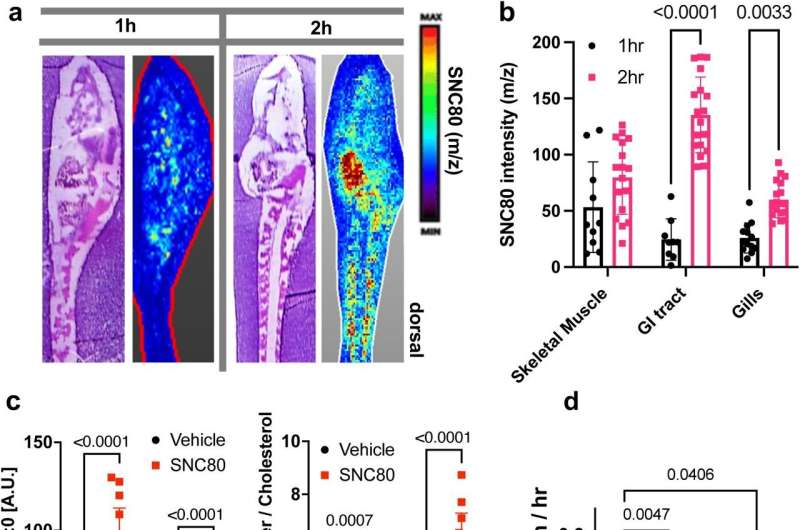This article has been reviewed according to Science X's editorial process and policies. Editors have highlighted the following attributes while ensuring the content's credibility:
fact-checked
trusted source
proofread
'Suspended animation' drug could aid organ transplantation and survival from traumatic injury

Researchers have shown that a non-addictive pain relief drug could be used to preserve cells and organs quickly and safely for transplantation, removing the need for static cold storage.
The research, published in eLife
, provides solid evidence that the existing drug, SNC80, can rapidly and reversibly slow biochemical and metabolic activities while preserving cell and tissue viability. The research suggests that SNC80 not only has the potential to ensure
The rapid and reversible slowing of metabolic and other physiological processes (called biostasis) improves the survival of cells and organs for transplantation. The conventional approach for achieving this is to lower temperature such that these processes slow down as they would during hibernation. However, prolonged cold storage can damage tissue and the systems currently used to keep cells and tissues alive can be challenging to use at the point of care or when resources are limited.
"There remains a large unmet need for improved tissue and organ preservation approaches for multiple clinical applications," says lead author Megan Sperry, a Research Fellow at the Wyss Institute for Biologically Inspired Engineering at Harvard University, Boston, US.
"In this study, we set out to identify potential drugs that could slow down metabolism and mimic states normally induced by hypothermia or hibernation. We needed an approach that was inducible in less than an hour and safely reversible—with major tissue functions returning to normal within 24 hours."
The team surveyed the scientific literature to identify candidate drugs with unintended side effects, such as lowering body temperature, and the drug SNC80—a compound that was developed as a non-addictive painkiller that works through the delta opioid pathway—caught their attention. It has been shown to induce hypothermia and to protect against the effects of blocked blood flow within the spinal cord. This led them to test whether it had the potential to slow metabolism on demand by giving it to tadpoles.
Within an hour of treatment, SNC80 reduced the swimming activity of tadpoles by 50% compared with untreated tadpoles and this was rapidly reversed once the drug was removed. SNC80 also reduced oxygen consumption (a measure of metabolism) and had extremely suppressive but reversible effects on heart rate.
Excited by these findings, the team's next step was to test the potential clinical value of SNC80.
"Heart transplants are currently hindered by donor shortage, the limited amount of time you can preserve heart tissue for and the lack of optimal preservation conditions," explains Sperry. "This means hearts can only be allocated to people who are within four hours' travel time from the donor. We wanted to see if SNC80 could induce biostasis in the heart, which could ultimately lengthen the time between organ donation and recipient surgery."
In collaboration with Vascular Perfusion Solutions, Inc, they explored this by testing whether SNC80 could preserve a donor pig heart over a six-hour period, during which the heart was kept in a portable, oxygenated preservation device maintained at a temperature of 20–23°C—i.e. below body temperature but not hypothermic.
SNC80 treatment caused a rapid decline in the heart's oxygen consumption to less than 50% of that of untreated controls, sustained over six hours. However, once they restored blood flow and restarted the heart using a defibrillator, they observed a rapid return to normal oxygen consumption levels and pulse rates.
Encouraged by this, the team explored whether the drug also induces biostasis in human cells, using organ-on-a-chip gut models. They found that SNC80 treatment caused a 6-fold drop in oxygen use—i.e., metabolism—after 48 hours, which progressively returned to normal as the drug was washed out of the cells.
The authors caution that further validation is required before SNC80 can be used in a clinical setting. Firstly, SNC80 is not currently approved for use in clinical settings—during pre-clinical trials of the drug, side effects, including seizures, were noted and its development was halted.
It is hypothesized that these seizures are related to SNC80's delta opioid activity, so the team has also created a new, non-opioid analog called WB3, which will be used in future work. Furthermore, in their study, the team characterized the function of the donor pig heart outside of the body, and so their future work will look to verify the function and quality of the hearts after they have been transplanted.
"Our findings demonstrate that SNC80 can be used to induce biostasis and produce a hypometabolic state which, in combination with a self-contained transport system, could potentially increase organ viability outside the body for sustained time periods," concludes senior author Donald Ingber, Founding Director of the Wyss Institute for Biologically Inspired Engineering at Harvard University.
"Moreover, the ability to induce a reversible, suspended-animation-type state rapidly through injection at the point of care could enable new therapeutic approaches to slow the effects of trauma and acute infection, increasing survival in a number of settings—from military and space exploration to civilian health emergencies such as road traffic accidents or limiting damage from stroke."
More information: Megan M. Sperry et al, Identification of pharmacological inducers of a reversible hypometabolic state for whole organ preservation, eLife (2024). DOI: 10.7554/eLife.93796.1



















